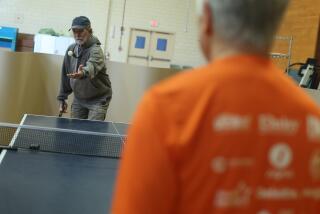Suicide Too Frequently a Foe for Military
- Share via
One of the first casualties of the war with Iraq came more than a week before allied forces dropped the first bomb or fired the first bullet.
Marine Pfc. James R. Dillon Jr., who had just turned 19 in the Kuwaiti desert, apparently took his own life, stepping into a portable toilet at a Marine staging area and shooting himself in the head with an M-16 rifle.
Dillon, a Pennsylvania native who trained in Twentynine Palms, left his comrades wondering if the pressure of the approaching war had been too much for the young man.
The death highlights a problem that has plagued the military, particularly the Marines, for years.
Suicide is the second leading cause of death in the military and a problem so serious it prompted the Defense Department to call recently for increased suicide-prevention efforts. Accidents, including motor vehicle crashes, are the leading cause.
Suicides claimed the lives of 118 active-duty servicemen and women in 2001 -- almost the number of American deaths so far in Iraq.
The overall suicide rate in the U.S. military is slightly higher than the rate for the nation’s civilian population. But the military suicide rates are at least 30% lower when compared with those of civilians in the same age, gender and racial groups.
Still, military officials worry that the suicide rate appears to be on the rise in the Marines, the youngest and smallest of the nation’s fighting units.
Marine Corps Gen. James L. Jones issued a statement in November warning that the number of suicides in the Corps for the fiscal year starting in October 2002 was on a pace that would double the 20 suicides of the previous 12 months. “We must focus our attention on ensuring every possible measure is taken to battle this tragic and senseless loss of life,” he said.
According to Marines and other experts, the higher suicide rates could be attributed to several factors: Marines are typically younger than their counterparts in the other military branches; the Marine Corps has a reputation for imposing higher standards on its members; and there is a pervasive attitude that any Marine who speaks openly about personal problems will be branded as weak or psychologically troubled.
Often, young Marines who feel pressure in trying to live up to the demands of the Corps will turn to alcohol to cope with the stress, said Candice Kirk, who retired last year after four years in the Corps.
“You have these young guys and, for the first time, no one is checking up on them, so they start drinking,” she said.
The average age of an enlisted Marine is 18 1/2, according to the Department of Defense.
Many young Marines have entered the Corps without the maturity or social skills needed to cope with typical life problems, said Larry Stratton, a retired Marine who oversees suicide- prevention efforts at the Marine Corps Air Ground Combat Center in Twentynine Palms.
“They get a ‘Dear John’ letter or a ‘Dear Jane’ letter, and to them that is the end of the world,” he said.
Joseph Matoush, a retired Navy chaplain who served during the 1991 Persian Gulf War, suggested that some Marines become frustrated because they expect the Corps to teach them a skill they can turn into a career after they return to civilian life.
But he said many Marines learn only how to fire a weapon -- a skill that does not translate to many civilian jobs.
A Military Mind-Set
Another possible factor is the image of a Marine as a tough-as-leather warrior impervious to pain -- an attitude that the Marine Corps acknowledges can make it difficult for young Marines to talk about their personal problems.
Daniel Clark, a psychologist with the Washington State Patrol and an expert on suicides in law enforcement and the military, said the biggest challenge is breaking down the military mind-set that a soldier who talks about personal issues will never get promoted.
“There is a lot of investment in covering things up that we would not see in the civilian population,” he said.
That situation is similar in the Navy, according to Petty Officer 3rd Class Miguel Rodriguez, who is aboard the aircraft carrier Nimitz in the Persian Gulf. He said in an e-mail that many sailors don’t feel comfortable talking about their troubles.
“If you need help, they have a chaplain you can go talk to, but not many people do that,” he said. “They just suck it in. It is true that most people have that attitude that they are supposed to be tough. That’s why it’s hard, if not impossible, to talk to them about any problems.”
The Marines have taken several steps to reduce suicides. The Corps has distributed a suicide-prevention kit, including a video and brochures that give tips on recognizing warning signs.
The short video shows Marines and sailors acting out the warning signs. There’s a scene in which one sailor tells another: “My wife is leaving me and my life ain’t worth two cents right now. As a matter of fact it ain’t worth living.” The narrator says Marines and sailors should feel obligated to report such comments to a chaplain or a commander.
The brochures, emblazoned with the words, “Taking action/Saving lives,” cite depression, impulsive anger, substance abuse and isolation as things to watch for. They include suggestions on where to get help.
At the base in Twentynine Palms, experts have increased the number of suicide-prevention lessons to at least one briefing a week. And the Navy has distributed posters that say: “It’s OK to get help. Getting help is a sign of strength.” The Navy also has a new system to improve the tracking of suicides by recording the age, gender and background of each decedent and the likely factors that led to the suicide.
Suicide-prevention experts in the military believe the potential for suicides drops during war because the troops turn their thoughts to the task at hand and away from marital concerns, financial worries and career problems -- the topics most often blamed for triggering thoughts of suicide. It is too early to tell if rates have dropped since the Iraq conflict began in March.
“As long as they are kept busy at war, I don’t think that suicide is as big a threat,” said Matoush, the retired Navy chaplain.
But he and other military experts say the risk could rise again after troops return home to face personal problems they left behind.
Because of that danger, the Army and Marine Corps have adopted new procedures in the last decade to help troops readjust to life after an extended deployment. As part of the effort, chaplains and commanders “debrief” family members about potentially suicidal behavior.
Returning Home
Meanwhile, troops returning home will meet with chaplains and other trained workers to talk about any problems they may face after reentry.
“I think we will be in a much better position than we have been in the past,” said Stratton, of the Marine base in Twentynine Palms.
The suicide rate in the U.S. military in 2001 was 12 deaths per 100,000, according to the Defense Department. The overall suicide rate in America is just under 11 deaths per 100,000.
But according to military researchers, the suicide rate of civilian Americans with the same demographic characteristics as members of the armed forces is 17 to 20 deaths per 100,000.
Experts and military officials note that the suicide rate in the Air Force has dropped dramatically since its suicide-prevention program was restructured in 1994. Suicide rates in the Air Force dropped from 16 deaths per 100,000 in 1994 to 5.6 deaths per 100,000 in 2001, according to the Defense Department.
Instead of giving high-ranking commanders sole responsibility for combating suicide, the Air Force gave chaplains, family support groups and officials in other units the training to recognize signs of depression and other suicide indicators.
As part of the effort, Air Force commanders also sought to shatter the impression that a good service member must keep his problems to himself, urging its members to confide in friends, comrades and others about personal problems.
Other branches of the military have adopted some of the Air Force’s techniques, but not all have had the same success.
The Marine Corps has consistently had the highest suicide rate of all the branches. In the last few years, that rate has jumped from a low of 11.7 deaths per 100,000 in 1997 to 16.2 deaths per 100,000 in 2001, according to the Defense Department.
No one is certain why Dillon shot himself in the Kuwaiti desert March 13, only four days after his 19th birthday. Some Marines in his unit told a reporter that Dillon had been considered the quiet “little brother” who worried that he would not be able to perform under fire.
“He got overwhelmed at how proficient others were in his platoon,” 1st Sgt. Miguel Pares told a reporter traveling with the battalion. “He was afraid that somebody would get killed because he was too slow.”
But Dillon’s family and friends in Mercer, Pa., say they still can’t believe that Dillon -- whom they called “Jamie” -- would take his own life. His stepfather, Sam Snyder, who raised Dillon from age 5 to 16, said Dillon joined the Marines because he wanted to be on the side of justice.
Snyder said he believes Dillon probably shot himself by accident. “You are going to have to show me evidence to prove to me that it was intentional,” he said.
Dillon graduated from high school in 2002 and soon after reported for Marine boot camp. On his birthday, March 9, Dillon’s comrades in the 3rd Battalion of the Light Armor Reconnaissance outfit surprised him with a “Happy Birthday” serenade.
He died four days later.
More to Read
Sign up for Essential California
The most important California stories and recommendations in your inbox every morning.
You may occasionally receive promotional content from the Los Angeles Times.














